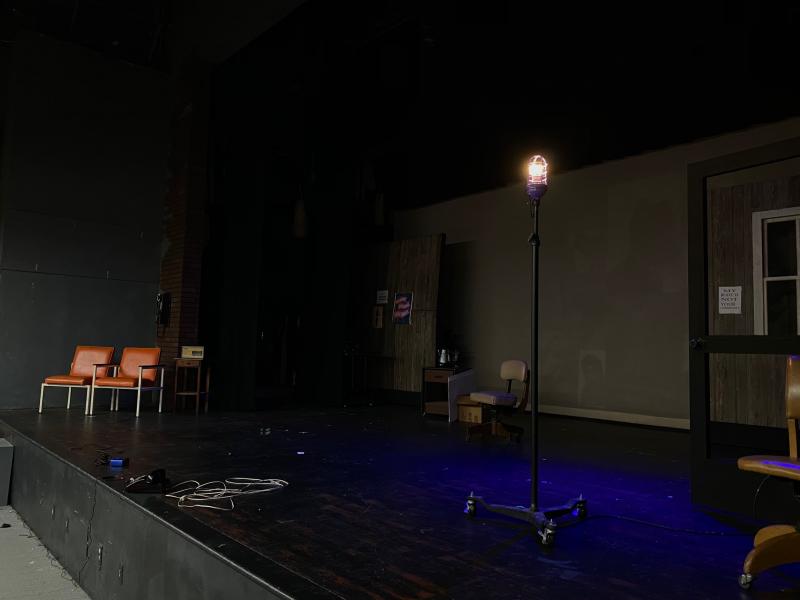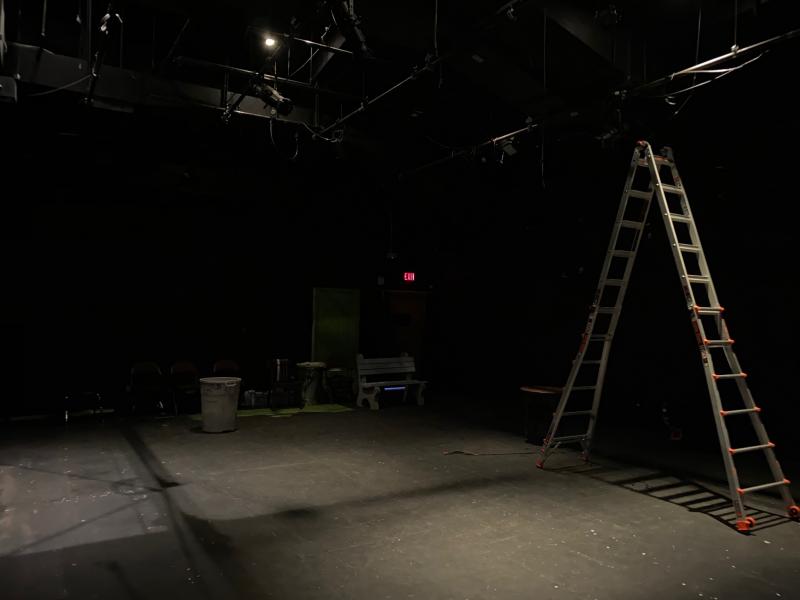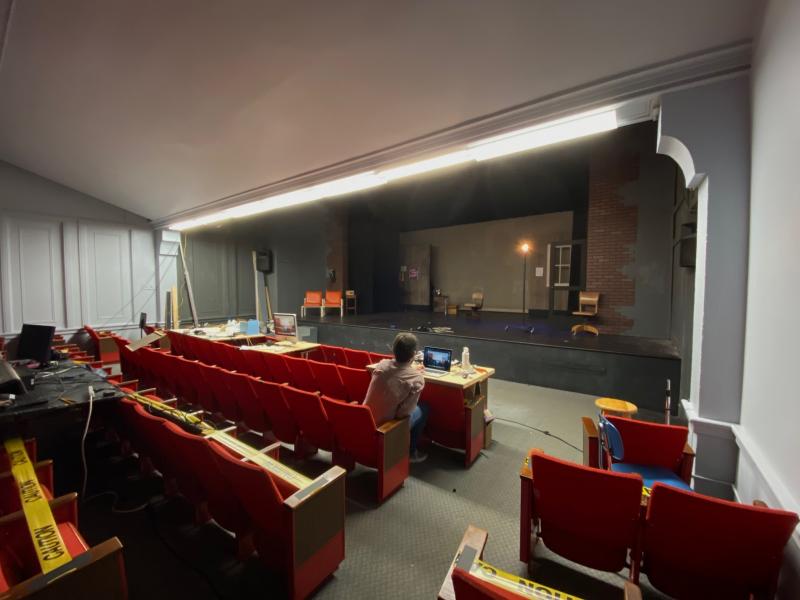On Wednesday, March 11, the World Health Organization declared the COVID-19 outbreak a pandemic. That same day, mere hours later, the students of Loyola University New Orleans were told that campus would be shutting down for the rest of the semester.
For many, this meant leaving behind friends, campus resources, and classes as things shifted online. It meant uncertainty and fear and perhaps the hope that this would blow over in a few weeks.
For the Department of Theatre Arts & Dance (TAD), this meant an end to Cabaret, a show months in the making and set to open in a week. The news tore through the department as the 50+ individuals working on the show saw their hard work come to an abrupt end. Although the show did not make it to its opening night, the department came together to make the evening’s planned rehearsal a performance for students and faculty.
As the curtain closed on the department’s one-night-only showing of Cabaret, the students and faculty parted ways. “When we left that night around midnight, we thought we would be back in just a week or two,” said Department Chair C. Patrick Gendusa. A week or two turned into a month, then two, then six.

Ghost light illuminating Marquette Theater, 2020.
What many thought would be gone after a few weeks of a stay-at-home order has shut down theatre across the globe for months. Broadway went dark just a day after Loyola TAD, and the prospect of a return is months away. Local New Orleans theatre companies cancelled show after show until many eventually cancelled entire seasons. Some may not even return after the pandemic due to financial instability. Such circumstances made it look like TAD students would return in the fall to a year of Zoom performances or nothing at all.
But, despite all odds, TAD has turned its lights back on and produced a show. Thanks to the ingenuity of TAD’s leadership, the department hasn’t let the pandemic stop the arts and is producing shows in a safe and socially distant manner.
This fall was accompanied by the addition of Sal Mannino, TAD’s new Artistic Director and Extraordinary Professor of the Arts. “Sal could not have joined us at a better time and I would not have survived this semester without him by my side,” Gendusa said. “We had many conversations about ‘How in the hell were we going to teach theater with everyone wearing masks, social distancing, and the possibility of staying online until January?’”
Mannino had the idea to contact Theatre For One, an NYC-based theatre company that specializes in performances featuring one actor and one audience member. “I figured every theatre in the country and every school in the country would be calling my former boss saying, ‘Hey, we want to do Theatre For One,’” said Mannino. “Turns out they weren’t. We were seemingly like one of the only ones who was doing that.”
As a result, a collaboration with Theatre For One replaced TAD’s original season opener, Metamorphoses by Mary Zimmerman. “We decided to do this for the simple fact that we cannot have actors splashing around in a pool during a pandemic!! ;)” Gendusa said in an email to the department. Metamorphoses features a series of vignettes all staged around a swimming pool, which is not exactly social distancing-friendly.
Theatre For One typically uses a road box, a large container usually meant to store equipment, for its performances to heighten the intimacy between actor and audience member. This, of course, would provide the opposite of a socially distant theatrical experience. So, the department got creative once again. “As a theatre artist I feel that kinda call to ask the question, ‘What can be a stage? Where can we see theatre?’” said Mannino.
Instead of staging Theatre For One in the traditional road box setting, TAD staged four different pieces from the Theatre For One catalogue outside and one virtually inside the Lower Depths Theater. This gave actors adequate space to be six feet apart from audience members and still gave them the opportunity to perform. The completely virtual piece even gave students who opted to remain online for the semester a chance to act again.

Empty Lower Depths Theater, 2020.
In total, there were around 60 individuals involved with Theatre For One in some capacity, as actors, designers, and everything in between. It even gave several alumni a chance to work at Loyola once again as directors: Monica Harris, Jessica Lozano, Constance Thompson, Bari Bellard, and Eduardo Ramirez. “To have them here again and sharing their talents with our current students made my heart smile,” said Gendusa.
Auditions for Theatre For One were held virtually as were the majority of rehearsals, though they were eventually held in person as opening drew nearer. Each piece utilized a cast of four to six actors who performed in shifts. This gave nearly thirty students the opportunity to perform for the first time in over eight months.
Theatre For One: For This Moment opened October 21 at Loyola University New Orleans. It was the only live theatrical production happening in New Orleans at the time with total masking and social distancing safety protocols in place. “To have the ability to share a story with another person for a few minutes and really connect with them after going so long without human connection was so special,” said Haley Sliker, a junior musical theatre major with a classical studies minor who performed in The Drifter, one of the four live Theatre For One micro-plays. “It was one of the most rewarding things I’ve ever done.”
As Theatre For One was in performances, Cadillac Crew was in rehearsals. Before the pandemic, Cadillac Crew had been chosen as the second show of TAD’s 2020-2021 season. Because the cast consists of only four women, it was decided that the show could go on as planned - with masking and social distancing, of course.
Like Theatre For One, the beginning of the rehearsal process took place over Zoom. Actors were led through character work by director Lauren Turner until they were ready to hit the stage in Marquette Theater. The larger of the two theater spaces at Loyola, this stage provided the cast with enough room to maintain six feet of distance.

Technical Director Duncan Becker working on technical elements of Cadillac Crew, 2020.
“It’s very cool to be doing theatre right now, but it’s also incredibly nerve-wracking,” said Cadillac Crew’s stage manager and sophomore theatre arts and graphic design double major Grace Smith. “You never know if someone is going to come into rehearsal to tell you that the show was cancelled or postponed.”
Despite taking all precautionary measures, Cadillac Crew has been postponed until the spring. However, this isn’t a result of COVID-19 outbreaks on campus. The show lost too much rehearsal time during hurricane season due to campus closures. As a result, Cadillac Crew will now open January 28.
The department has plans to produce the rest of its season in the spring, starting with Cadillac Crew. It will be followed by another show of four, Stop Kiss, in March. The musical, Head Over Heels, is slated to open in April with a cast of eight or more, depending on the size of its ensemble. “I’m trying to stay pretty optimistic,” said Mannino. “You know, we’ll have to do a little bit more of this. But we’ll get out of this.”
The department plans on being creative with its staging for the remaining three shows of the season. Nothing will be produced without masking, socially distant staging, and audience members spaced six feet apart. “We are still figuring out what our specific approach will be for each show as things seem to change daily,” said Gendusa. “It’s our goal as an educational institution to train our student-artists to be resourceful and inventive even in the toughest of times.”
Though COVID-19 may have cut TAD’s production short in the spring, it hasn’t taken the optimism of the department. More than anything, the Loyola TAD community seems happy to be able to be a community once again.
“We are grateful we are still here. We are grateful we are together,” said Gendusa. “We are theater people. We will adapt and we will survive this together.”
By Madeline Taliancich